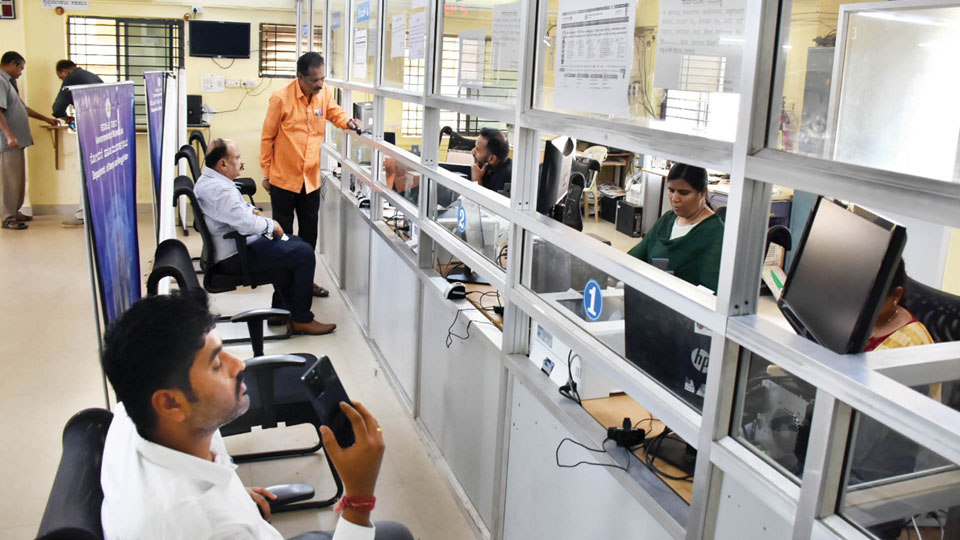Mysore/Mysuru: Revenue from property registrations in Mysuru is poised to decrease due to a decline in property registrations at Sub-Registrar Offices, attributed to the strict enforcement of the Model Code of Conduct for the upcoming Lok Sabha elections.
According to real estate stakeholders, property registration typically experiences a downturn during elections. Many real estate developers, property buyers and investors prefer to wait until after the elections to proceed with transactions. Additionally, the increase in Police and official checks on vehicles carrying large amounts of cash without proper documentation has contributed to the decrease in registrations.
Concerns about heightened scrutiny at various checkpoints and the risk of carrying substantial amounts of cash during the election period have made property owners and buyers cautious. Many are reluctant to carry large sums of money without valid documentation, as failure to produce proper documentation for cash exceeding Rs. 50,000 can result in seizure by enforcement squads. Consequently, individuals are opting to postpone transactions until the conclusion of the election process.
30 to 40 percent decrease now
A veteran deed writer from Mysuru, who has over 15 years of experience in the field, speaking anonymously to Star of Mysore, revealed that there has been a noticeable decline in registrations across all Sub-Registrar Offices.
Currently, the registrations being processed are primarily from the previous week due to significant server issues with the Kaveri 2.0 software, resulting in a backlog of tasks. Consequently, new registrations are not taking place and existing tasks are being carried forward.
“Typically, I receive information about property purchases approximately two weeks prior, as necessary documents such as the EC (Encumbrance Certificate) must be prepared for transactions. I usually handle between six to ten property deeds weekly. However, since the enforcement of the Model Code of Conduct, I have only written two deeds,” he said.
He estimates a notable 30 to 40 percent decrease in property registrations now.
Anticipating a further decline, he predicts that once nominations are filed and transaction scrutiny intensifies, registrations could plummet by 70 to 80 percent.
Furthermore, clients and property owners are refraining from formal agreements regarding property purchases. Typically, these agreements are signed and a token advance is paid before registration. However, due to strict monitoring of cash withdrawals and transport exceeding Rs. 50,000 has deterred parties from engaging in written agreements, he added.
Book value, market prices differ
Manohar, a retired Sub-Registrar, noted that as the year-end approaches, there is typically a decline in loan-based property registrations.
This decline occurs because banks tend to refrain from disbursing loans towards the end of the year to ensure proper accounting, reserving such transactions for the following financial year.
“Despite assertions from senior officials suggesting minimal variance between the guidance value (or book value) and market prices, the actual land rates vary significantly from locality to locality, city to city, and village to village. Moreover, there is often a percentage of undisclosed income involved in transactions, which may go unnoticed by the Government,” he said.
While intra-family land transactions, such as gift deeds, may continue, new property registrations are expected to suffer due to the stringent enforcement of the model Code of Conduct, he added.
Muralidhar, a deed writer from Periyapatna, said that before the enforcement of the code of conduct, he would typically handle between eight to ten property deeds and agreements per day, with auspicious Fridays or Mondays sometimes seeing up to 15 deeds written.
However, since the implementation of the Code of Conduct, there has been a noticeable dip, with Muralidhar now only completing around eight deeds per week.
No significant fluctuations in property registrations
During every election cycle, property registrations are notably affected. It has been approximately a week since the announcement of election dates, yet there hasn’t been a significant fluctuation in property registrations compared to the preceding week before the imposition of the Model Code of Conduct. The State Government has recently revised the guidance value to align more closely with prevailing real estate rates or market value, with a marginal difference. This adjustment aims to minimise the involvement of black money and most transactions now occur through bank transfers or account payments. If there is indeed a decline in registrations, its extent will only become evident in the following week or later. —Vijayalakshmi Inamdar, District Registrar, Mysuru








Recent Comments